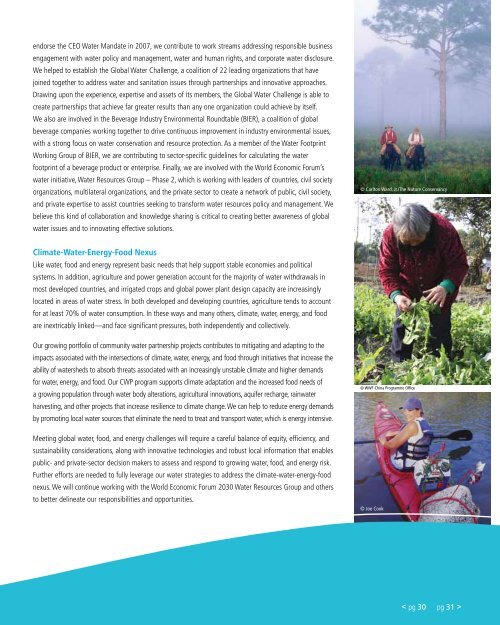Water Stewardship and Replenish Report - Psddev.com
Water Stewardship and Replenish Report - Psddev.com
Water Stewardship and Replenish Report - Psddev.com
You also want an ePaper? Increase the reach of your titles
YUMPU automatically turns print PDFs into web optimized ePapers that Google loves.
endorse the CEO <strong>Water</strong> M<strong>and</strong>ate in 2007, we contribute to work streams addressing responsible business<br />
engagement with water policy <strong>and</strong> management, water <strong>and</strong> human rights, <strong>and</strong> corporate water disclosure.<br />
We helped to establish the Global <strong>Water</strong> Challenge, a coalition of 22 leading organizations that have<br />
joined together to address water <strong>and</strong> sanitation issues through partnerships <strong>and</strong> innovative approaches.<br />
Drawing upon the experience, expertise <strong>and</strong> assets of its members, the Global <strong>Water</strong> Challenge is able to<br />
create partnerships that achieve far greater results than any one organization could achieve by itself.<br />
We also are involved in the Beverage Industry Environmental Roundtable (BIER), a coalition of global<br />
beverage <strong>com</strong>panies working together to drive continuous improvement in industry environmental issues,<br />
with a strong focus on water conservation <strong>and</strong> resource protection. As a member of the <strong>Water</strong> Footprint<br />
Working Group of BIER, we are contributing to sector-specific guidelines for calculating the water<br />
footprint of a beverage product or enterprise. Finally, we are involved with the World Economic Forum’s<br />
water initiative, <strong>Water</strong> Resources Group – Phase 2, which is working with leaders of countries, civil society<br />
organizations, multilateral organizations, <strong>and</strong> the private sector to create a network of public, civil society,<br />
<strong>and</strong> private expertise to assist countries seeking to transform water resources policy <strong>and</strong> management. We<br />
believe this kind of collaboration <strong>and</strong> knowledge sharing is critical to creating better awareness of global<br />
water issues <strong>and</strong> to innovating effective solutions.<br />
Climate-<strong>Water</strong>-energy-Food nexus<br />
Like water, food <strong>and</strong> energy represent basic needs that help support stable economies <strong>and</strong> political<br />
systems. In addition, agriculture <strong>and</strong> power generation account for the majority of water withdrawals in<br />
most developed countries, <strong>and</strong> irrigated crops <strong>and</strong> global power plant design capacity are increasingly<br />
located in areas of water stress. In both developed <strong>and</strong> developing countries, agriculture tends to account<br />
for at least 70% of water consumption. In these ways <strong>and</strong> many others, climate, water, energy, <strong>and</strong> food<br />
are inextricably linked—<strong>and</strong> face significant pressures, both independently <strong>and</strong> collectively.<br />
Our growing portfolio of <strong>com</strong>munity water partnership projects contributes to mitigating <strong>and</strong> adapting to the<br />
impacts associated with the intersections of climate, water, energy, <strong>and</strong> food through initiatives that increase the<br />
ability of watersheds to absorb threats associated with an increasingly unstable climate <strong>and</strong> higher dem<strong>and</strong>s<br />
for water, energy, <strong>and</strong> food. Our CWP program supports climate adaptation <strong>and</strong> the increased food needs of<br />
a growing population through water body alterations, agricultural innovations, aquifer recharge, rainwater<br />
harvesting, <strong>and</strong> other projects that increase resilience to climate change. We can help to reduce energy dem<strong>and</strong>s<br />
by promoting local water sources that eliminate the need to treat <strong>and</strong> transport water, which is energy intensive.<br />
Meeting global water, food, <strong>and</strong> energy challenges will require a careful balance of equity, efficiency, <strong>and</strong><br />
sustainability considerations, along with innovative technologies <strong>and</strong> robust local information that enables<br />
public- <strong>and</strong> private-sector decision makers to assess <strong>and</strong> respond to growing water, food, <strong>and</strong> energy risk.<br />
Further efforts are needed to fully leverage our water strategies to address the climate-water-energy-food<br />
nexus. We will continue working with the World Economic Forum 2030 <strong>Water</strong> Resources Group <strong>and</strong> others<br />
to better delineate our responsibilities <strong>and</strong> opportunities.<br />
© Carlton Ward, Jr./The Nature Conservancy<br />
© WWF-China Programme Office<br />
© Joe Cook<br />
< pg 30 pg 31 >




